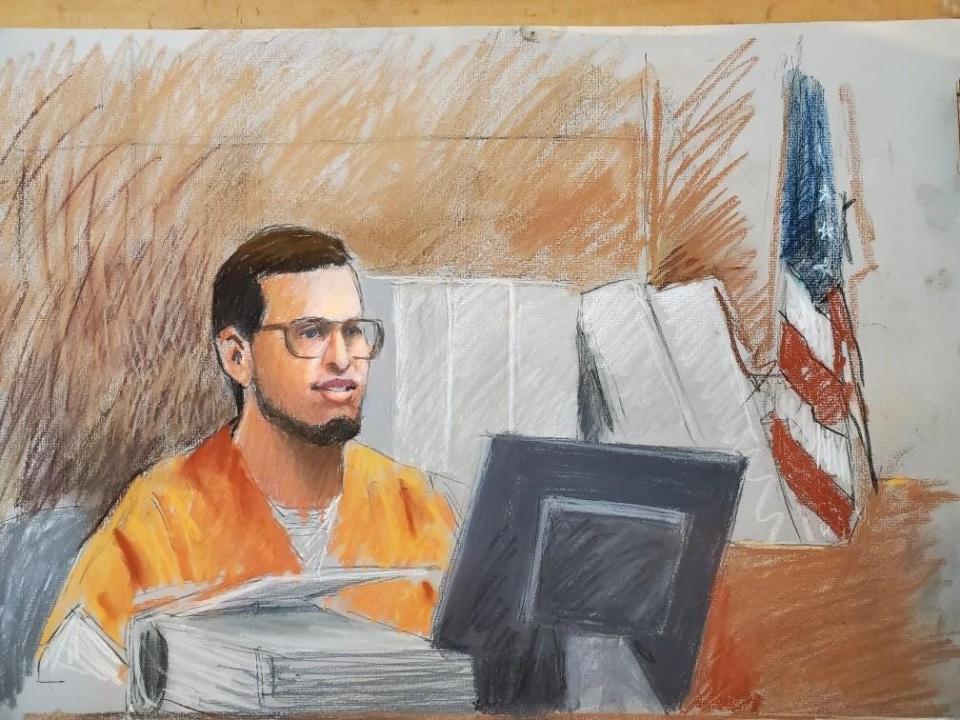Feds ask to shorten prison term of witness in Whitmer kidnap case
- Oops!Something went wrong.Please try again later.
One day after two men were convicted of plotting to kidnap Gov. Gretchen Whitmer, the prosecution moved to help one of its key witnesses get out of jail sooner: convicted plotter Ty Garbin, who told jurors that his cohorts were willing participants in the scheme, just like him.
In a Wednesday court filing, prosecutors asked the judge to trim three years off of Garbin's sentence for his "significant assistance" leading to the convictions of Adam Fox and Delaware trucker Barry Croft Jr., who are facing up to life in prison when they are sentenced in December.
Garbin, who cut a deal with the government in August 2021, got a sentence of just over six years — 75 months — after pleading guilty to kidnapping conspiracy and agreeing to cooperate. Prosecutors say he deserves a break for that cooperation, noting he made himself vulnerable to retaliation.

Witness undercuts defense argument
"Garbin continues to serve his sentence under a substantial risk of retaliation, particularly from inmates sympathetic to Fox and Croft’s terrorist ideology," the prosecutors wrote. "Garbin’s assistance has been remarkable for its timeliness, its duration and the personal risk he assumed to fulfill his obligations under his plea agreement."
Garbin, a 26-year-old airline mechanic from Hartland, testified in two trials — the first one ending in no convictions. His testimony contradicted the defense theory that the men were set up by rogue FBI informants and agents who, they maintained, were trying to advance their careers.
Garbin told jurors that wasn't the case at all.
He told jurors in the retrial the same thing he said in the initial trial: No one forced him or the others to join a plan to kidnap the governor, that Fox was the leader and was collecting money to buy explosives, that the plan involved blowing up a bridge to slow down law enforcement and that they all cased Whitmer's house together on a cold fall night, with no pressure from any undercover FBI informants or agents who had infiltrated their group.
Attorneys for Fox and Croft sought to discredit Garbin, portraying him to the jury as an unreliable, self-serving snitch who was only testifying to save himself from getting a longer prison sentence.
More:Jury convicts Adam Fox, Barry Croft Jr. in Whitmer kidnapping plot
More:How 3 controversial jurors wound up in the Whitmer kidnap jury box
Croft's lawyer suggested to Garbin that he was afraid of going to prison.
"Not really," Garbin responded.
"You're going to prison labeled as a snitch," Blanchard said, adding inmates don't treat cooperators well in prison.
Garbin came back with statistics, saying 60% of federal prisoners have all cooperated and taken plea deals, "so I'm not concerned" about that.
According to trial testimony, Garbin, who was nicknamed "Gunny" in encrypted group chats, was the group's de facto weapons expert. Fox and others went to him for advice on which guns would be best for an operation, he testified.
Garbin's role was to snatch the governor with Fox
Garbin told jurors that his role was to be part of the team that broke into Whitmer's home and snatch her. He said Fox had the same role.
Garbin also walked the juries through what he described as the planning stages of the plot, how it started off with discussions about storming the Capitol and turned to kidnapping the governor.
Along the way, Garbin said, the group eventually grew fearful that an informant or FBI agent had infiltrated the group. So members took extra measures to make sure they weren't caught. For example, he said, in order to get into the meeting, members were asked to bring identification, everything from a driver's license or birth certificate to pay stubs, military discharge papers or a jail tag.
Garbin also told jurors that he did hope to get a shorter prison sentence for his testimony — but that nothing had been guaranteed to him.
In solitary confinement for his protection
According to the government, Garbin has been jailed since his arrest in an FBI sting two years ago and has "been moved from facility to facility to accommodate the government’s trial preparations" and keep him separate from his co-defendants.
"He was at times housed in solitary confinement to protect him from retaliation," Assistant U.S. Attorneys Nils Kessler and Christopher O'Connor wrote in their filing.
Garbin, meanwhile, will continue to serve his sentence in county jails for the foreseeable future as he is expected to also testify in upcoming state trials against others charged with providing material support for domestic terrorism. He may also be called by the U.S. Attorney’s Office if contested factual issues arise at the sentencings of Fox and Croft, the prosecutors wrote.
"He remained forthright in admitting his part in the conspiracy, and did not minimize his culpability," prosecutors wrote of Garbin. "His testimony was corroborated by independent evidence, including undercover recordings and other witness accounts."
Contact Tresa Baldas: tbaldas@freepress.com
This article originally appeared on Detroit Free Press: Whitmer kidnap: Feds seek shorter term for conspirator who testified

